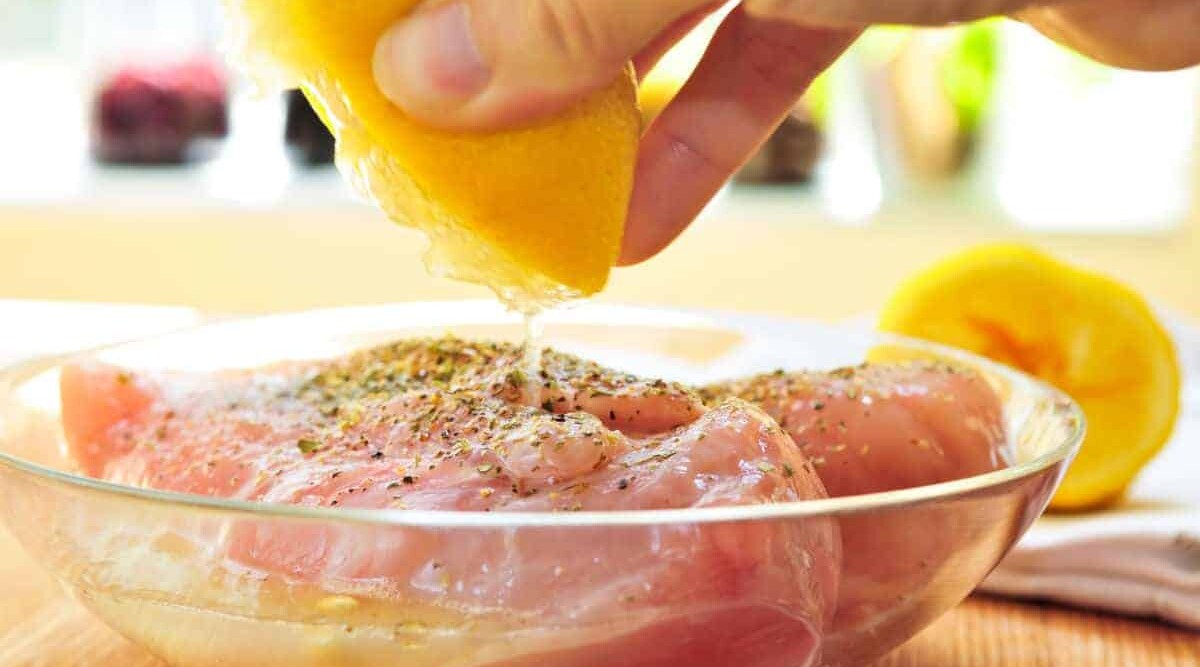
In this article, we’ll explore the mystery of marinade, talk about what goes in it, and, most importantly, how long to marinate chicken to let the flavors go deep and enhance more than just the surface.
Maybe it’s just me, but I feel like chicken is the easiest meat to get wrong on the barbecue. That might be partly because there are three degrees to which a piece of chicken can be cooked: not safe, safe, and burnt beyond recognition.
What is it with the dry, flaky chicken so many people serve off the grill?
Well, I’m here to tell you that delicious barbecue chicken is possible without having to go to a restaurant!
The obvious solution is to cook to a safe temperature and then douse it with barbecue sauce. But why not enhance the flavor of your chicken, instead of drowning it?
My favorite way to prepare chicken for the barbecue is to marinate it. A good marinade adds flavor and moisture, without ever hiding the fact you’re eating chicken.
Now, let’s see if we can’t put chicken in its rightful place — on your grill!
Key Takeaways — How Long to Marinate Chicken
- Marinate a whole bird — Min 4 hours, max 12
- Marinate skinless, boneless chicken breasts — 30 minutes to 2 hours
- Marinate skin on, bone in breast — 1 to 2 hours.
- Marinate chicken quarters, bone in thighs, wings — 1 to 6 hours
Jump to:
What Is A Marinade, and Why Do We Use It?
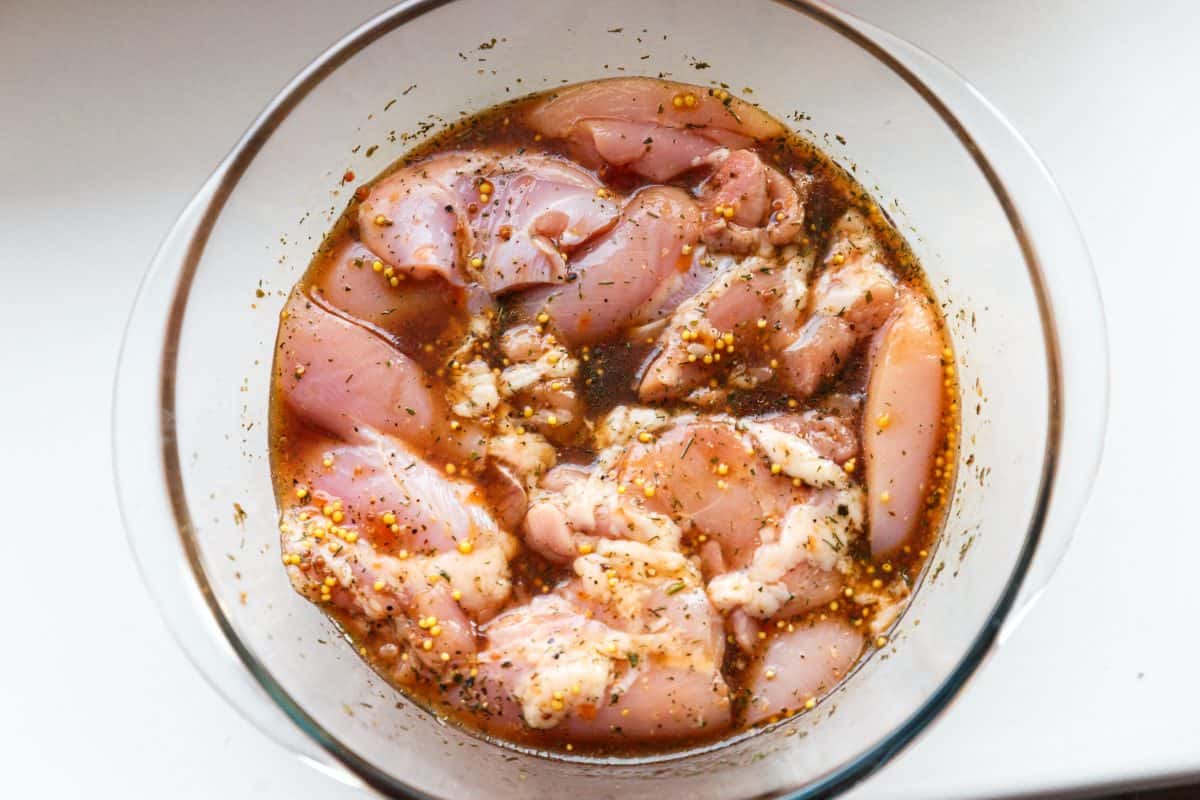
At the risk of stating the obvious, a marinade is a fluid in which one immerses a cut of meat to tenderize it, and/or add flavor and moisture.
There are all manner of marinades to choose from, some simple, some complicated, but most can be divided into two basic categories: acidic and enzymatic. Each kind reacts with the meat but in different ways.
Acidic marinades are based on mild acids like vinegar, apple juice, or wine. Acids attack and denature proteins, causing them to form a microscopic mesh that traps moisture in the meat.
Enzymatic marinades use things like pineapple, guava, or ginger. Enzymatic fluids break down the connective tissue and muscle fiber, tenderizing the meat as they do so.
Dairy-based marinades are a third option. Yogurt is a common marinade base, especially in Middle Eastern cuisine. Technically, yogurt marinades are acidic, but the lactic acid is so mild, it interacts much more gently than non-dairy acidic marinades.
The original marinades were basic brines made for the preservation of fish. It doesn’t take much imagination to see that “marinade” and “maritime” have a common root. People still brine meats, but the technique is recognized as distinct from marinating.
Safety Tips For Marinating
Food safety is paramount when you’re working with raw meat. Handle your chicken carefully, and wash your hands after each time you touch it.
Because the marinade is in constant contact with the raw meat, some bacteria on the meat will find its way into the marinade. That’s ok, because you’re going to cook it and kill all the bacteria. But it does mean you need to be careful with the leftover marinade.
The guidelines are to throw away any unused marinade that’s been in contact with chicken — unless you boil it for a good time first.
Choosing the right kind of container is also important. Plastic resealable bags, glass containers, and reusable plastic containers are all good, so long as they close tightly. Don’t use aluminum because acids may react with the metal and negatively affect the flavor and color of the chicken.
Always marinate in the refrigerator rather than on the counter. Marinades do not protect you from bacteria-borne illness, so it’s important to maintain a consistent low temperature to keep the meat safe until it’s time to cook.
Different Flavors of Marinade
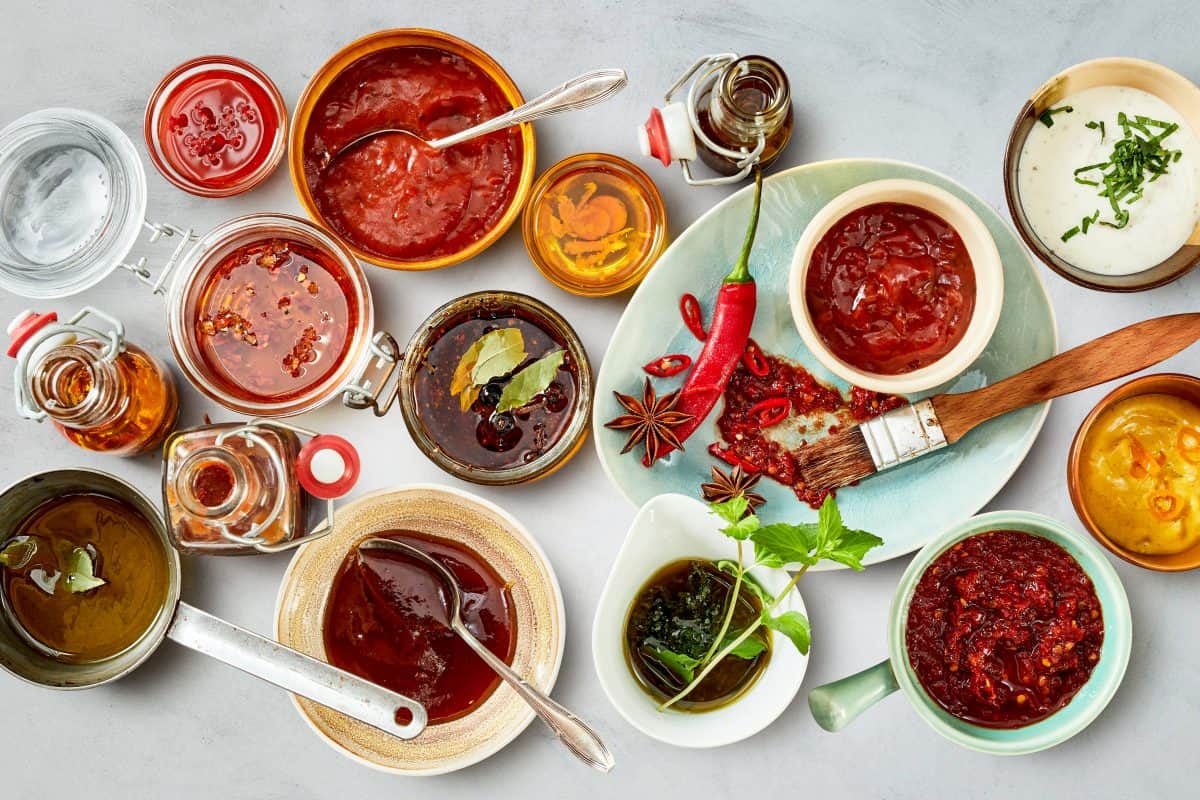
The varieties of marinades for chicken are virtually limitless if you consider each slight variation on a theme to be distinct.
Fluids and seasonings can be combined in seemingly infinite ways, always depending on your personal preference.
Some basic examples include:
- Teriyaki
- Jerk
- Lemon Pepper
- Red Wine
- Carne Asada
- Apple Juice
- Provençal Herb
Of course that’s just the tip of the tip of the iceberg, but you get the idea. Keep in mind the kind of marinade you use because that could impact how long you let it sit for.
How Long to Marinate Chicken?
Ok, here we’re answering the big one: how long do I let my chicken sit in the stuff before I can call it marinated? That’s an important question.
If you don’t leave it long enough, you won’t impart much flavor.
On the other hand, chicken left in an acidic marinade for too long will actually get tougher as the protein molecules squeeze closer together. An excessive bath in an enzymatic marinade makes meat mushy and, to use the technical term, gross.
Chicken is less dense than beef, so it doesn’t need to soak overnight like a thick steak might. Still, the size of the cut will make a difference, so don’t assume one time fits all.
According to the United States Department of Agriculture’s Food Safety and Inspection Service, chicken could be left in a marinade in the fridge for two full days. That means it would still be safe to cook and eat after that length of time, but I cannot imagine under what circumstances you’d want to do that.
To marinade an entire chicken, you’ll need at least 4 hours for decent penetration, but soaking as long as 12 hours, depending on the size of the chicken and the nature of the marinade, is not out of the question. Also, we’re talking about marinating defrosted chicken. If it’s frozen the marinade will not penetrate. (You can check out our guide on how to defrost chicken fast, if you’re curious ;-))
For skinless chicken breast, it’s possible to add decent flavoring in as little as 30 minutes, especially if you poke some holes in the surface to allow the marinade to penetrate. You’ll achieve tastier results, however, if you let it sit for up to 2 hours.
Thighs can be quite thick and may take anywhere from 1 to 6 hours to properly flavor. Anything with skin should sit a minimum of 2 hours to allow the fluid to get through to the meat.
So we recommend the following marinating times for different pieces of chicken:
- Whole bird: Min 4 hours, max 12
- Skinless, boneless chicken breasts: 30 minutes to 2 hours
- Skin on, bone in breast: 1 to 2 hours.
- Chicken quarters, bone in thighs, wings: 1 to 6 hours
The Difference Between a Marinade and a Brine
Firstly, what is brining? It is a process during which we soak meat in a salty water solution, with the primary aim of helping the meat hold onto more moisture at the end of the cook.
A brine can contain flavorings, but it MUST contain salt and water in order to do its job.
A marinade has a primary purpose of adding flavor to your meat. It does not have to contain salt or water. It can be made of oils, herbs, spices, juices and more.
So it’s a brine primarily for helping meat to remain moist after a cook, and it’s a marinade for primarily adding flavor.
Final Thoughts
Now you know a little something about marinades, I hope you’ll start getting experimental with fluids and flavors and perhaps create your own “secret blend.”
Years of bad barbecue taught me to be wary of chicken on the grill, but when I see the chef pulling the meat out of a bag or bowl of marinade, I know things are probably going to be just fine.
If you have any personal marinade tips please share them with us and our community, that we might all reap the benefits of your wisdom. Mind you, if you want to keep your secret a secret, we won’t blame you!
Happy grilling!


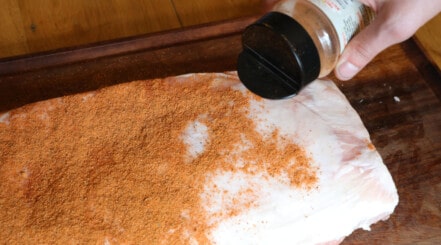
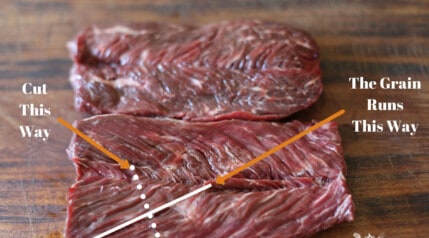


This is brilliant! I use half a cup of yogurt with some salt and pepper, turmeric, red chili powder, a teaspoon of ginger garlic paste, juice of 1 fresh lemon and a couple of Curry leaves. Marinade for 2 hours, on the grill. Flavors of South India
Sounds good to me. Thank you, for adding this, Winash 🙂
I use skin and bone in chicken breasts. A few garlic cloves chopped, olive oil, Italian seasoning, 1-2 lemon zest’s, salt, pepper, crushed red pepper, paprika and a little onion powder. I let it sit for 4-6 hours since I’m using the zest and not the lemon juice and make sure I get it underneath the skin.
Sounds great to me 🙂
I add some olive oil, pepper, salt, lemon juice, soy sauce, sugar, and Chinese cooking wine. Great pan grilled.
Sounds good, Jeryl. This is the great thing about chicken — and to a slightly lesser extent pork — It is a great blank canvass to be able to layer up so many different flavors. So many different world cuisines, spices, herbs and other flavors work well with chicken, there really isn’t much you can’t do with it. You could probably eat chicken every day of the year and not have to sue the same flavor marinade or rub twice 🙂
I marinate chicken in the Cornell mix. Awesome. When I lived in NYS, that is what is used practically statewide. State and county fairs and backyards. I haven’t had it in the time I’ve lived in Phoenix, but I’m about to give it a try shortly. Yumm
My favorite marinade for chicken and fish:
Extra virgin olive oil, Dijon and spicy brown mustard, a dash of Worcestershire sauce, fresh squeezed lemon, minced garlic, plenty of dill, thyme, basil, and rosemary, a little brown sugar, a little salt, black, white, green, and pink peppercorns, and voilà! The best marinade EVER.
Sounds a winner to me! Thanks, Amanda.
The information provided here is absolutely handy. Especially for beginners. Thanks.
Thanks, Dean.
Guava paste, oyster sauce, soy sauce/salt, minced garlic in sauté pan long enough to melt the guava paste. Add cinnamon, allspice, honey, brown sugar, and 3-4 cloves long enough to steep cloves. I’ve added some guajillo pepper powder to enhance smokiness and give a little background warmth. Marinade overnight for bone-in, skin-on chicken thighs. Grill on open flame to get a good char, internal temp to 160 degrees, pull and rest for 10-15 minutes.
The ingredients here are amazing, but still wonder where to get them in Kenya?
Sorry, Willy, I can’t help with that one I’m afraid 🙁
Very interesting information
Thank you 🙂
I marinate chicken for chicken katsu use vanilla powder, salt and pepper, yes, it works in 30 minutes, thank you very much for the tips.
Any cut of chicken, about a tablespoon or two of each, (depends on how much I’m making):
That’s pretty much the base.
From there you can branch out into different flavor profiles, like for something with more east Asian flavors I would add:
It’s kind of impossible to make a bad marinade. As long as you have an acid, sugar, fat, and some spices, then you’re good to go.
Can I use an Acidic marinade topped up with milk on chicken breast for 24hrs
Hi Colin,
I wouldn’t recommend it, as marinating in an acidic liquid for that length of time will cause the surface to not just tenderize, but to be really mushy, and I’m not sure if you’d enjoy it. As I understand it, milk is slightly acidic too due to the lactose / lactic acid it contains, so this will not offset the acidic marinades effect.
I marinate in fresh pepper mix, salt bullion cubes, fresh garlic and ginger and vegetable oil and curry powder and rosemary all mixed together.
Hello I plan on making some nice fried chicken and I want to know what will. Happen if I marinade it for 12 hours and then cook it, what will happen to the meat and the texture? I want that nice and crunchy flavor, without it falling off or feeling smushy
Hi Xavier,
It entirely depends on what you are planning to marinate it with, and if it’s chicken pieces or an entire bird?
How many times must we eat food from the grill that is burnt to a crisp but raw in the middle? A chef taught me how to properly grill chicken. The trick is this. Take the chicken legs, boil them first with your spices, there… I said it… Boil them. Not so much as the meat disintegrates but just enough that it’s cooked through. Now, let it cool and bathe it in your favorite sauce. Let it soak overnight in your sauce. Grill it the next day. Folks will heap you with praise. Best chicken you will ever eat.
” How many times must we eat food from the grill that is burnt to a crisp but raw in the middle?” — Simply cook with indirect heat, with a controlled and measured temperature on your grill. It’s just like your kitchen oven, with added flavor from charcoal / smoke (if you wish.)
If the technique you describe works for you, and you love the results, that’s great and is all that matters. That’s the joy of food and cooking, there’s many different techniques and ways to cook, and as long as you like what you produce then it’s a success!
Trick is don’t walk away from the grill it only takes a second for a flare up.
What a great blog! I love all the international ideas and flavors from the other commenters. If I may offer a suggestion for the boneless skinless chicken breasts, pound them out so they are an even thickness before placing them in the marinade. This allows for them to cook evenly when you place them on your grill or pan.
Great advice, thank you!
Chicken breasts: My tastiest results come from an indoor rotisserie & 2 ingredients: kosher salt and oregano. Cover chicken with olive oil so the salt and oregano will stick on both sides. Let them set for 30-60 mins then cook and serve. 2 ingredients, perfectly cooked (the suggestion to pound the breasts for even cooking was excellent).
Steak: Costco Rib eye — USDA choice, high quality beef — so tender it’s unreal. Like Mark noted, Indirect heat cooking is stress-free and works great. Personally, if you have a great piece of meat, that’s all you need. Just put kosher salt on both sides, grill it and enjoy nature.
Hey, there! I love this advice and these varied suggestions! Here in Australia, I use:
Marinate for 2-4 hours, then cook indirectly on BBQ for 20 mins, then directly for 5-10 mins for char — Delicious!
Hey Mark, honestly thank you for taking the time to write this, jokes, humor, your personality, and all.
Why didn’t you mention skinless boneless thighs? That’s what I was looking for. Thx
1 to 6 hours for thighs, but more toward the high end to ensure it penetrates the skin.